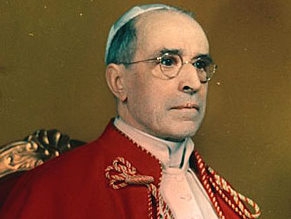|
World Jewish News

Pius XII was pope from 1939 until his death in 1958.
|
Pope's remarks on Pius XII and the Jews raise eyebrows in US and France
23.11.2010, Jews and Society The American Jewish Committee on Sunday criticized Pope Benedict XVI for saying his World War II-era successor, Pope Pius XII, "did all he could to save people," in the current pontiff's new book.
"There is certainly enough evidence to refute those who charge that Pius XII stood idly by while the lives of Jews and others were imperiled," said rabbi David Rosen,the AJC's international director of interreligious affairs.
"On the other hand, not only did Pius XII never directly challenge the Nazi regime regarding the extermination of the Jews; perhaps even more dramatically, he never publicly expressed any condemnation, let alone express of regret, subsequent to World War II."
Rosen said that "the Shoah (Holocaust) represents the darkest abyss of our history and perhaps of human history. For us (and perhaps for all), one can never say that any persons did all they could have done in the face of such evil unless they laid down their life to oppose it ?!"
In France, the umbrella representative group of Jewish organizations, CRIF, said that Pope Benedict’s opinion "wasn't shared by any serious historian."
"It is regrettable that the pope didn’t bother to analyse historians works, some of which are recent," Richard Prasquier, head of CRIF, said.
"History shows that Pius XII never expressed himself directly to defend the Jews during WWI," he added.
Pope Benedict said Pius "did all he could to save people," in a book of interviews due out Tuesday in Pope Benedict's native Germany.
The pontiff noted that Pius XII in 1938 prior to his reign as pope had written to all Catholic bishops urging them to intervene to support visa requests for Jews trying to leave Germany.
"Naturally, one can always ask: 'Why did he not protest more strongly?' I believe he saw that the consequences could have been a public outcry," said the pope.
"He personally suffered enormously, we know this. He knew that he eeded to speak and yet the situation prevented him," he said.
While Pius XII was pope, the Nazis rounded up more than 1,000 Roman Jews for deportation on October 16, 1943. Only a handful returned from the death camps.
Six million Jews died in the Holocaust.
In December last year, Jews were up in arms when Pope Benedict moved Pius XII a step closer to sainthood with a decree bestowing the title "venerable."
The Roman Catholic Church has long argued that Pius XII, who was pope from 1939 to 1958, saved many Jews who were hidden away in religious institutions, and that his silence was born out of a wish to avoid aggravating their situation.
In 2008, the pope infuriated the Jewish community with a decision to lift the excommunication of a known Holocaust denier, English bishop Richard Williamson.
Asked about the potential beatification of Pius, Rosen said that in his view "nothing should be done for as long as direct victims of this terrible period are still with us in this world."The new book, entitled "Light of the World: The Pope, the Church and the Signs of the Times", is the first collection of interviews with the pontiff since the then cardinal Joseph Ratzinger became pope in April 2005.
The 20 hours of interviews were conducted by German journalist Peter Seewald.Seewald asked more than 90 questions on three major themes during conversations conducted July 26-31 at the pope's summer residence in the Italian town of Castel Gandolfo.
A former communist, Seewald became Catholic after meeting Cardinal Ratzinger, with whom he produced two earlier volumes of interviews.
EJP
|
|
